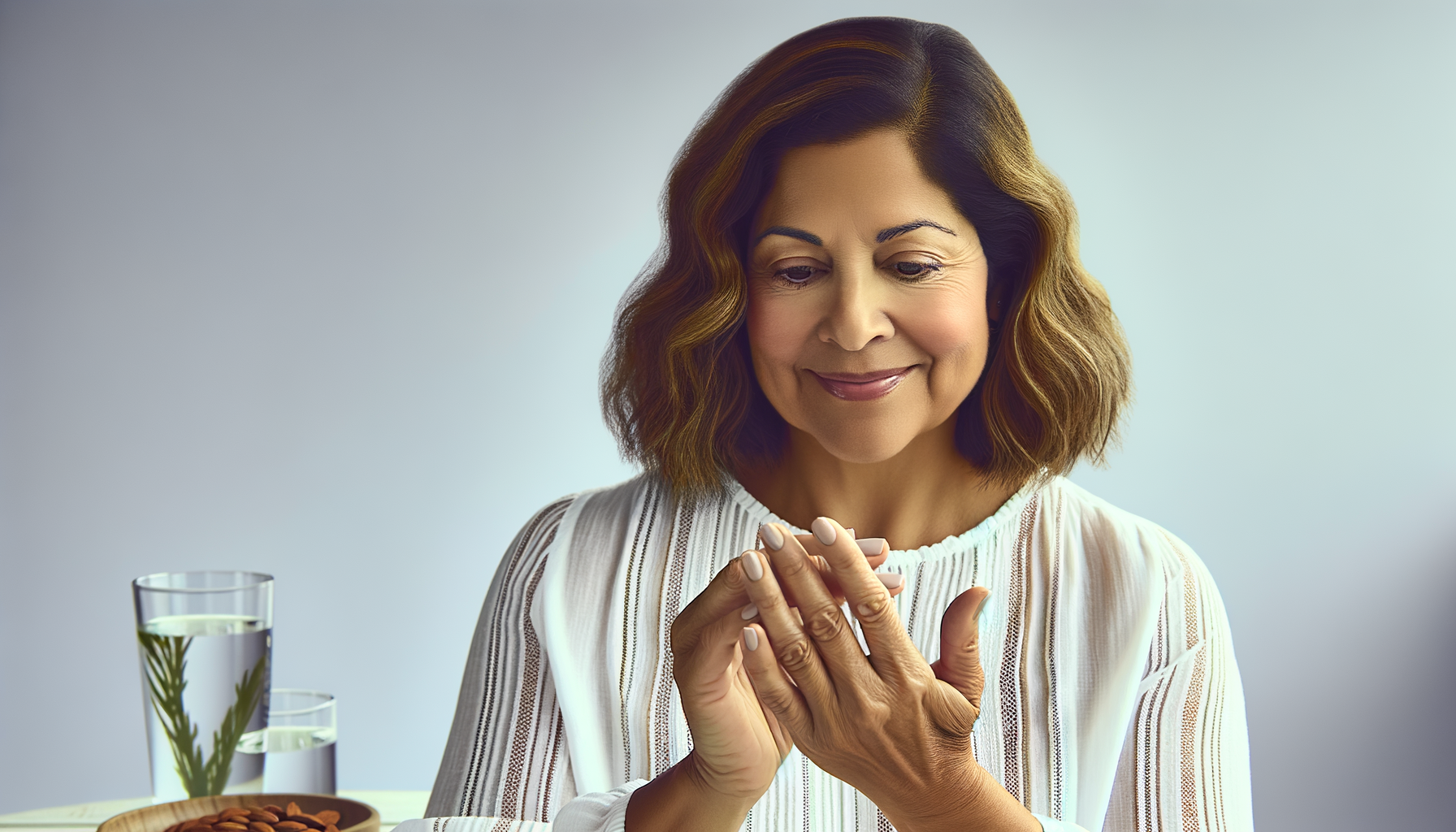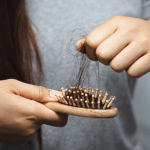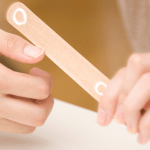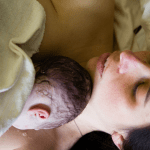Menopause is a natural biological process that marks the end of a woman’s reproductive years, signified by the cessation of the menstrual cycle. This transition typically occurs between the ages of 45 and 55 and is confirmed when a woman has not had a period for 12 consecutive months. The biological process involves a decline in the production of hormones, particularly estrogen and progesterone, by the ovaries. This hormonal shift has widespread effects on the body, including changes in hair and nail health.
Hormonal Changes and Their Effects on the Body
The hormonal changes during menopause are significant, as estrogen and progesterone levels decrease, while androgen levels may remain constant or even increase. These hormonal fluctuations can lead to a variety of symptoms, including hot flashes, mood swings, and changes in skin elasticity. Estrogen, in particular, plays a crucial role in maintaining the health of hair and nails, and its decline can lead to noticeable changes in their appearance and condition.
Specific Changes in Hair During Menopause
As estrogen levels dwindle, many women experience changes in their hair’s texture and growth patterns. Common hair-related symptoms during menopause include:
- Hair thinning: A reduction in hair density and volume, often resulting in a wider parting or more visible scalp.
- Slower hair growth: The anagen (growth) phase of the hair cycle shortens, leading to slower hair growth.
- Dry and lackluster hair: Decreased estrogen can lead to a loss of shine and moisture in the hair.
- Increased hair breakage: Hair becomes more fragile and prone to breakage.
- Hair loss: Many women experience overall hair loss rather than bald spots, which is often temporary and can be managed with appropriate care and treatment.
Specific Changes in Nails During Menopause
Similar to hair, nails are also affected by the hormonal changes of menopause. They may exhibit the following symptoms:
- Brittleness: Nails may become more prone to breaking and chipping.
- Dryness: A decrease in moisture can lead to dry, brittle nails that split easily.
- Changes in texture: The development of ridges and variations in nail thickness.
- Slower growth: Nails may grow more slowly as a result of hormonal changes.
- Alterations in color: Nails may develop white spots or change in color.
Understanding these changes is the first step in addressing the impact of menopause on hair and nails. With proper care and treatment, it is possible to mitigate these effects and maintain healthy hair and nails throughout the menopausal transition.

Symptoms and Signs of Menopausal Hair and Nail Changes
Identifying Menopause-Related Hair Symptoms
Menopause can significantly alter the condition of a woman’s hair. As estrogen levels decline, many women experience a range of symptoms that may include:
- Increased scalp visibility: Thinning across the scalp can make the skin more apparent.
- Widening of the parting: The area of exposed scalp along the hair part may become broader.
- Temple recession: Hairline changes, such as a recession at the temples, can occur.
- Reduced hairline density: A noticeable decrease in the number of hairs around the hairline.
- Diminished hair thickness: Individual strands may become finer, contributing to an overall thinner look.
- Increased hair breakage: Hair may become more fragile and prone to breaking.
- Excessive hair shedding: Losing more hair than usual can be a sign of menopausal changes.
- Slower hair growth: Hair may not grow as long as it used to, with a noticeable slowdown in growth rate.
- Dry and lacklustre appearance: Hair may lose its natural shine and feel dry to the touch.
These symptoms can be distressing, but understanding that they are a common part of the menopausal transition can help in seeking appropriate treatments and adjustments in hair care routines.
Recognizing Menopause-Related Nail Symptoms
Similar to hair, nails can also be affected by the hormonal changes of menopause. Some of the symptoms that may indicate menopausal changes in nails include:
- Increased brittleness: Nails may become more prone to breaking or chipping.
- Thinning nails: Nails might appear thinner and more fragile than before.
- Development of ridges: Vertical ridges or striations may become more prominent on the nail surface.
- Changes in nail color: Nails may develop white spots or change in color, indicating a lack of nutrients or hydration.
- Splitting nails: Nails may split more easily, making them difficult to maintain.
These changes can be exacerbated by external factors such as exposure to chemicals in beauty products or dehydration. It’s important to note that while some nail symptoms can be attributed to menopause, they can also be indicative of other health issues, so consulting a healthcare professional is advisable if there is concern.
By recognizing these symptoms early, women can take proactive steps to manage the effects of menopause on their hair and nails, helping to maintain their health and appearance during this natural transition.
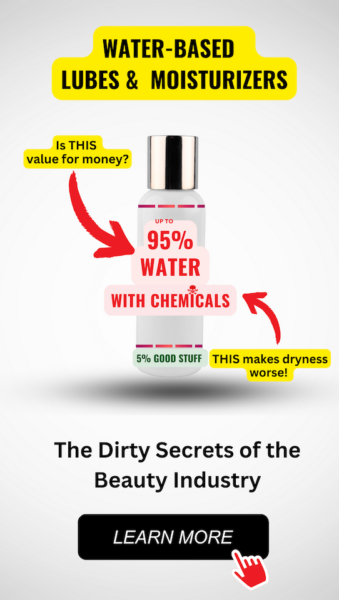
Feeling You Have a Right to Safe Beauty & Fem Care?
If so, it may be time for a change. It starts with knowledge. We have a few suggestions in our new guides.
Natural and Lifestyle Remedies for Menopausal Hair and Nails
Stress Reduction Techniques
Menopause can be a stressful time, and stress can exacerbate hair and nail issues. Techniques such as yoga, meditation, and deep-breathing exercises can help manage stress levels. Even simple activities like taking a walk or enjoying a hobby can act as effective stress relievers. Reducing stress can help maintain a hormonal balance that is beneficial for hair and nail health.
Dietary Adjustments and Hydration
A balanced diet rich in vitamins and minerals is crucial for maintaining healthy hair and nails during menopause. Foods high in omega-3 fatty acids, such as salmon and flaxseeds, can help nourish hair and strengthen nails. Including protein from lean meats, beans, and nuts is also important, as hair and nails are primarily made of keratin, a protein. Hydration plays a key role; drinking at least eight glasses of water daily ensures the body, hair, and nails are well-hydrated, countering the dryness often experienced during menopause.
Exercise and Its Benefits for Hair and Nail Health
Regular physical activity can improve circulation, which in turn can promote hair growth and nail health. Exercise also helps in stress reduction and maintaining a healthy weight, which can have positive effects on hormonal balance. Activities such as brisk walking, swimming, or cycling can be particularly beneficial.
Proper Hair and Nail Care Practices
Adopting gentle hair and nail care practices can mitigate menopause-related damage. For hair, this means using a soft-bristled brush, avoiding excessive heat styling, and choosing shampoos and conditioners that are hydrating and free from harsh chemicals. For nails, it’s important to keep them moisturized with water-free, chemical-free hand lotion like Angie and to protect them by wearing gloves during household chores. Additionally, avoiding nail polish removers with acetone can prevent further dehydration and brittleness.
By the way, something for you, a little gift!!!
I am just in the middle of publishing my book. It’s about How women can balance their hormones. One part is about food and diet, of course.
Follow this link and enter your email.
I will send you this part of the book for free once the book is published. It has many concrete, practical tips and recipes and will help you feel better during menopause or times of Big hormonal fluctuations.
Annette, Damiva Lead for Health & Wellness

Scientifically-Backed Treatments for Hair Issues During Menopause
Hair Stimulants and Oils
During menopause, the decrease in estrogen levels can lead to hair thinning and loss. To combat these issues, hair stimulants and oils can be effective. Products containing minoxidil have been shown to help reduce the rate of hair loss by keeping hair in the growth phase longer. Additionally, natural oils such as rosemary and peppermint have been suggested to stimulate the scalp and promote hair growth. These oils can be massaged into the scalp to improve circulation and encourage healthy hair follicles.
Shampooing Techniques and Products
Proper shampooing can play a crucial role in managing menopausal hair issues. It is recommended to wash hair at least every other day to maintain scalp health. When shampooing, it’s important to massage the shampoo onto the scalp and gently spread it through the hair without scrunching, which can lead to breakage. Look for shampoos that are free from harsh sulfates and contain hair-thickening ingredients such as caffeine, biotin, or keratin. Conditioners should provide lightweight hydration without weighing hair down. A wide-toothed comb can be used post-shower to minimize tangling and breakage.
Professional Medical Interventions
For those experiencing significant hair issues during menopause, professional medical interventions may be necessary. Consulting with a dermatologist can lead to treatments such as hormone replacement therapy (HRT), which can restore estrogen levels and potentially improve hair health. Blood tests can also identify any underlying deficiencies that may be contributing to hair loss, such as low levels of iron or vitamin D. In some cases, prescription medications or topical treatments may be recommended to address hair thinning and loss. It’s essential to discuss all options with a healthcare provider to determine the most appropriate and effective treatment plan.
Addressing Nail Concerns in Menopause
Moisturizing and Protecting Nails
During menopause, nails can become dry, brittle, and prone to breaking. To combat these issues, it is essential to keep nails and cuticles well-moisturized. Regular application of a nourishing hand cream, particularly after washing hands, can help maintain moisture levels. Look for creams enriched with vitamins E and B5, which are known for their skin and nail conditioning benefits. Additionally, wearing gloves during household chores can protect nails from harsh chemicals and prevent further drying or damage.
Nail Polishes and Hardening Treatments
Applying nail polish can add a protective layer to your nails, potentially preventing breakage associated with menopause. When choosing a nail polish, consider formulas that include nourishing oils or hardening agents that promote nail strength. For those who prefer a clear look, there are transparent nail hardeners available that can provide similar benefits without the color. It’s also worth exploring professional treatments such as gel or dip manicures, which can offer a more durable protective layer for weakened nails.
Avoiding Harmful Chemicals and Practices
To preserve nail health during menopause, it’s crucial to avoid products and practices that can exacerbate nail problems. Acetone-based nail polish removers are particularly dehydrating and should be replaced with acetone-free alternatives. Additionally, refrain from habits like nail-biting or using your nails as tools, which can lead to splitting and breakage. When filing your nails, opt for a gentle approach, using a fine-grit file to shape nails without causing stress to the nail plate.
By implementing these strategies, you can help address the nail concerns that often accompany menopause, leading to stronger, healthier nails.
Do you know the three main ways that your body gets in touch with harmful chemicals with everyday products? Knowledge is Power!
The Ultimate Detox Guide will tell you how to lower your exposure to harmful chemicals!

The Role of Supplements in Managing Menopausal Hair and Nail Health
Essential Vitamins and Minerals for Hair and Nails
During menopause, the body experiences a decline in estrogen levels, which can lead to changes in hair and nail health. To combat these changes, certain vitamins and minerals are essential. Iron is crucial for preventing hair loss, as it plays a significant role in the production of hair follicle cells. Zinc supports hair growth and repair, while biotin, a B vitamin, is known for its role in maintaining the health of hair, skin, and nails. Vitamin D is also important, as it can help with hair follicle cycling. Foods rich in these nutrients include lean meats, leafy greens, nuts, seeds, and fortified foods. However, it’s important to consult with a healthcare provider before starting any supplement regimen to ensure proper dosage and to avoid potential interactions with other medications.
Specialized Supplements for Menopause
Menopause-specific supplements often contain a blend of vitamins, minerals, and herbal extracts designed to target menopausal symptoms, including those affecting hair and nails. Ingredients such as phytoestrogens may help to balance hormone levels, while antioxidants like vitamins C and E can protect hair and nails from oxidative stress. Omega-3 supplements can provide the fatty acids necessary for maintaining healthy hair and scalp. Additionally, supplements like collagen can provide the amino acids needed to build keratin, the protein that makes up hair and nails.
Understanding the Importance of Professional Guidance
While supplements can be beneficial in managing menopausal hair and nail health, it’s important to seek professional guidance. A healthcare provider can offer personalized advice based on individual health needs and can monitor for any side effects or interactions with other treatments. They can also recommend high-quality supplements and advise on the correct timing and dosage. It’s essential to approach supplementation with caution and to use it as part of a comprehensive approach to menopausal health that includes diet, exercise, and lifestyle modifications.
Long-Term Strategies and Considerations
Hormone Replacement Therapy (HRT) and Its Effects
Hormone Replacement Therapy (HRT) is a treatment used to alleviate symptoms of menopause by replenishing the body’s estrogen and progesterone levels. For many women, HRT can be a game-changer when it comes to managing menopausal symptoms, including the health of hair and nails. Estrogen plays a crucial role in promoting hair growth and maintaining the strength of nails. By restoring estrogen levels, HRT can help reduce hair thinning and loss, and improve the condition of nails that may have become brittle or weak during menopause. However, it’s important to note that HRT is not without risks and should be considered carefully in consultation with a healthcare provider. Potential side effects include an increased risk of blood clots, stroke, and certain types of cancer.
Monitoring and Adjusting Treatment Over Time
As with any long-term treatment plan, it’s essential to monitor the effects of therapies and make adjustments as needed. Regular check-ins with a healthcare provider can help ensure that treatments for hair and nail health during menopause are effective and that any side effects are managed promptly. Blood tests may be necessary to monitor hormone levels, and treatments may be adjusted based on these results and individual responses. It’s also important to be vigilant about any new symptoms or changes in health and to communicate these to a healthcare provider.
Embracing the Transition: Psychological and Emotional Support
Menopause is not only a physical transition but also an emotional and psychological one. The changes in hair and nail health can affect self-esteem and body image. Seeking support from friends, family, or support groups can be beneficial. Additionally, speaking with a therapist or counselor can provide strategies to cope with the changes and maintain a positive self-image. Embracing the transition as a natural phase of life and focusing on overall well-being can help women navigate menopause with confidence and grace.
Ultimately, long-term strategies for managing hair and nail health during menopause should include a combination of medical treatments, lifestyle adjustments, and emotional support. By taking a holistic approach, women can address the challenges of menopause effectively and maintain their quality of life.
